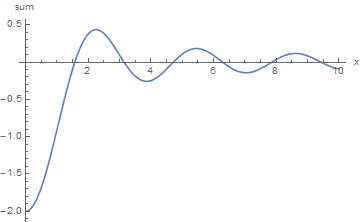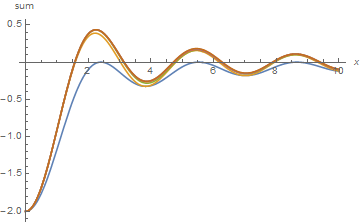My friend has a sum in his research paper that looks like this
$$ \sum_{n=-\infty}^{\infty}\frac{J_n^2(x)}{n-\kappa}. $$
He was able to calculate this sum analytically, by substituting the denominator with an integral. I wonder, is there a way to calculate this in Mathematica by adjusting some options in the Sum[BesselJ[n, x]^2/(n - К), {n, -Infinity, Infinity}].
Thank you in advance!
UPD People were interested in how to take this sum analytically. So if you substitute
$$ \sum_{n=-\infty}^{\infty}\frac{J_n^2(x)}{n-\kappa} = \sum_{n=-\infty}^{\infty}J_n^2(x)(-i)\int_0^\infty e^{-i(\kappa-n)t}\mathrm{d}t =, $$
where we can now exchange the integration and summation and use $n\to-n$ symmetry
$$ =(-i)\int_0^\infty\mathrm{d}t\left\{\sum_{n=1}^{\infty}J_n^2(x)\left(e^{-i(\kappa-n)t}+e^{-i(\kappa+n)t}\right)+J_0^2(x)e^{-i\kappa t}\right\}. $$
Then we take out the $e^{-i\kappa t}$ and get $2\cos{nt}$, so the whole sum becomes
$$ \sum_{n=-\infty}^{\infty}\frac{J_n^2(x)}{n-\kappa} = (-i)\int_0^\infty\mathrm{d}t\left[e^{-i\kappa t}\left\{2\sum_{n=1}^{\infty}J_n^2(x)\cos{nt}+J_0^2(x)\right\}\right], $$
and now can be easily taken
$$ \sum_{n=-\infty}^{\infty}\frac{J_n^2(x)}{n-\kappa} =(-i)\int_0^\infty e^{-i\kappa t}J_0\left(2x\sin{\left({t\over 2}\right)}\right)\mathrm{d}t. $$
Now we have a geometrical progression $a_{n+1}=qa_{n}$, where
$$ a_0=\int_0^{2\pi} e^{-i\kappa t}J_0\left(2x\sin{\left({t\over 2}\right)}\right)\mathrm{d}t,~~\text{and}~~q =e^{-2\pi i \kappa}. $$
So
$$ \sum_{n=-\infty}^{\infty}\frac{J_n^2(x)}{n-\kappa} =(-i)\sum_{n=0}^{\infty}a_n=i\frac{a_0}{q-1}. $$ $a_0$ can be found using the integrals shown below on pic, but still Mathematica is not helpful to take it.




Integrate @@ Sum[ ... ], but that probably won't be equal to the original expression and in any event Mathematica doesn't evaluate that either. $\endgroup$